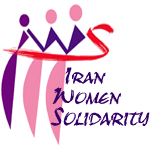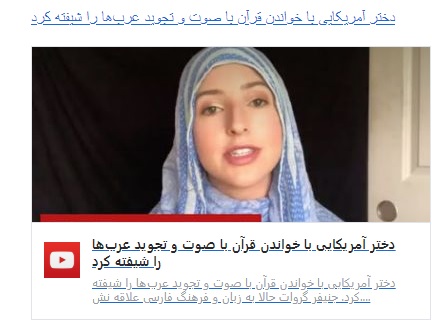BBC Persian
All the versions of this article:
[English]
[فارسى]
On May 4th, in the program 60 Minutes on BBC Persian, Jamal Mousavi interviewed Jeniffer Jennifer Grout, a young American artist who plays the “aud.” She had recorded several videos from her performances without hijab, singing solo in Arabic and Persian, including some of the Googoosh’s songs, along with her dancing. She was introduced to the audiences in this program not as an artists, but as a new convert to Islam who observes even the Islamic restrictions, including hijab. Of course in this interview she refused to sing popular songs, and instead chanted verses from the Quran, followed by reciting some poems by Molana.
The question immediately comes to mind, what is the significance of such program, and introducing such a personality, given that the BBC’s audience has suffered for four decades from mandatory adherence to Islamic law, most of which is opposed to human rights, liberty, and freedom. What sort of message could such an interview deliver? What sort of reactions are expected from the people who are not allowed to have basic rights to choose their own belief system, including Islam?
People who do not accept this hereditary religion are doomed to be deprived of any citizenship rights: the right to their properties, the right to education, the right to enter any profession or even having access to a secure cemetery. Indeed, Iran is the only regime in the world that openly persecutes followers of any religion but those acknowledged and recognized by Islam, such as Bahaism or Ahl-e Haqq. Aside from the issue of discriminatory views, this interview raises many questions such as why she is not asked any question about her opinion regarding Muslim woman’s rights to choose exactly the opposite of what she had the right to choose. What about the women who do not want to choose Islam and convert to Christianity? Or those who are not willing to recite the Quran but prefer singing Googoosh’s songs, or not to wear the hijab?
Indeed, we would like to ask the BBC why they never interviewed a person who had converted to another religion? Does anybody have the right to do so? Why has the BBC never interviewed any Iranian who is not a Muslim to talk about her/his faith and how they feel living in the Islamic Republic of Iran. Or why they haven’t invited, say, Ameneh Sharghi, the Tunisian blogger who was accused of insulting what is considered sacred and holy in Islam and was therefore subjected to criminal prosecution. Why haven’t they invited the thousands of Muslim women who were arrested, convicted, imprisoned, etc. due to their choice of lifestyle preferences?
What makes this white American women’s freedom of choice more worthy of being broadcast? What message is supposed to be conveyed to the general Persian-speaking audiences of this program? Does the BBC expect to receive any reaction but anger from it?
1. Leyla Aslani Germany
2. Ameneh Bamdadi Germany
3. Mojtaba Bavarsani Germany
4. Mahshid Pegahi Germany
5. Nahid Housseini England
6. Golrokh Jahangiri Germany
7. Fariba Davoodi Mohajer USA
8. Fathie Zarkeh Yazdi England
9. Sharagim Zand Turky
10. Helia Hagh Italy
11. Mina Siegel USA
12. Aghdas Shabani Germany
13. Manijeh Erfani-far Germany
14. Shahla Abghari Germany
15. Mitra Fazeli Germany
16. Akhtar Ggasemi Germany
17. Monireh Kazemi Germany
18. Khatereh Karimi Germany
19. Farah Kamangar Germany
20. Elahe Machouf Canada
21. Marmar Moshfeghi Sweden
22. Masoudeh Miri Italy
23. Sabri Najafi Italy
24. Nahid Nosrat Germany
25. Shain Nawai Germani
26. Tonia Valioghli USA
27. Shadi Valizadeh Germany

